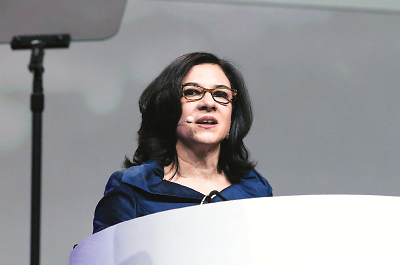Prevention is the future of American medicine and of psychiatry, APA President-elect Maria Oquendo, M.D., said last month in her Opening Session address at APA's 2016 Annual Meeting, where she introduced her theme for the coming presidential year, “Prevention Through Partnerships.” During the lecture, she emphasized the importance of collaboration with colleagues in primary care and other specialties.
“In the last two decades, medicine has been moving at an accelerated pace toward focusing on prevention,” Oquendo said. “The concept is to identify those at risk, before any symptoms emerge through the use of genetic and other molecular markers. For psychiatry, this of course is a very exciting prospect, but one that seems quite out of reach at the moment. I propose to you that we need not wait that long. I submit to you that not only can we work toward prevention, but that the best way to do so will be through partnerships.”
She continued, “In thinking about the many ways that APA makes a difference for our members and our patients every single day, it seems to me that we can also leverage our membership and leadership to develop partnerships with other disciplines in medicine and with the community.”
Oquendo said the growing movement toward integrated care offers unique opportunities for prevention through partnerships. “One of the salient models for integrated care proposes that the psychiatrist be embedded in the primary care setting, working closely with physicians, nurse practitioners, physician assistants, and case workers. The notion is that the psychiatrist would oversee the care of all the patients in that practice or setting. Straightforward, bread-and-butter cases of depression or anxiety would receive their treatment from the nurse practitioner or physician assistant under the supervision of the psychiatrist, reserving the psychiatrist’s direct care for the more complex or treatment-refractory cases. Interestingly, implied in this model is that the number of individuals requiring psychiatric assistance in an ordinary medical practice is simply too large for one person to care for. Rather, an entire team would be needed to address the mental health needs of the population under that practice’s care. This model is intended to identify individuals suffering from mental illness. But there is no reason why care could not be extended to those who have subthreshold symptoms.”
Partnerships with physicians in pediatrics and obstetrics-gynecology can be especially fruitful for psychiatrists and their women patients. She noted that 1 in 4 women will suffer from depression either during or after pregnancy and that maternal mental health impacts the child’s mental health and development.
“Most do not present for psychiatric care, yet intervention for this population is an essential task. … It is now crystal clear that maternal mental health has a tremendous impact on outcomes for her child. It has impact on that child’s nutrition. It has impact on that child’s vaccination schedule. It has impact on that child’s home environment. It has impact on that child’s early education. But more strikingly, it has a direct impact on that child’s mental health. In fact, we know from studies that if a mother is depressed, her children are more likely to exhibit behavioral symptoms.”
Oquendo concluded her remarks saying that the future is bright for psychiatry and for the prevention of mental illness. “We know more about the brain than ever, and new treatments are being developed that range from pharmacology to behavioral interventions and from brain stimulation to psychological treatments. We are poised to join our sister disciplines in medicine to develop preventive strategies. These will be the centerpiece of 21st Century medicine and 21st Century psychiatry.” ■

